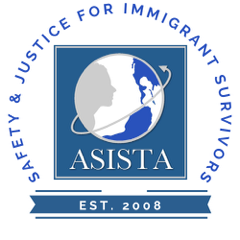ASISTA Celebrates USCIS Fee Schedule Rule as Victory for Immigrant Survivors of Violence
On January 31, 2024, USCIS published its Final Rule Adjusting the USCIS Fee Schedule. The new regulation, which goes into effect on April 1, 2024, is a significant victory for immigrants applying for survivor-based benefits. ASISTA and our partners pushed for the rule to be as expansive as possible in its humanitarian fee exemptions, as part of our ongoing advocacy for improved safety, stability, and legal access for immigrant survivors. We applaud USCIS and DHS for hearing us and recognizing that survivors often experience extreme economic difficulties that should not prevent their access to justice. This final rule takes an important step by codifying and expanding fee exemptions for survivors and other vulnerable groups, ensuring that cost is not a barrier in the pursuit of lawful status.
We encourage attorneys to take the time to review the final rule to understand how it will benefit their clients, and consider participating in the USCIS National Engagement on the rule, happening Feb. 22, 2024. Here are some of the important changes that will impact immigrant survivors applying for benefits:
Immigrant survivors of violence will benefit enormously
from ample exemptions to USCIS filing fees.
The final rule codifies fee exemptions for most humanitarian-related forms of relief and provides additional fee exemptions for certain immigration benefit requests beyond the initial humanitarian related filing. These exemptions are true exemptions and do not require submission of a fee waiver request. For example, under the new rule, all forms associated with an application for T nonimmigrant status, including Form I-192 waiver applications and Form I-765 work permit applications, are fee-exempt through final adjudication of the Form I-485. Other applicants who will benefit similarly include VAWA self-petitioners and their derivatives, U-visa applicants, Special Immigrant Juveniles, conditional residents applying for a waiver of Form I-751 based on battery or extreme cruelty, Special Immigrant Afghan or Iraqi Interpreters or Translators and other vulnerable applicants. Practitioners can find the complete list of the recently codified additional fee exemptions in the final rule in Table 5C here.
New, higher fees may still impact survivors
who apply for non-survivor-based immigration benefits.
Survivors pursuing a non-survivor-based immigration option that will not be fee-exempt should be advised that the new rule may increase the cost of that application. Such applicants may choose to file before the rule takes effect or prepare for the additional expense if they must file after April 1, 2024. Practitioners should be aware of the following notable changes in the final rule:
- Applications for naturalization, even if filed by survivors, are not fee-exempt, but will have expanded fee reduction options.
- Benefit requests submitted electronically will save $50.
- Fee waivers will continue to be available for many applicants who do not qualify for an exemption, but receive mean-tested public benefits, have income at or below 150% of the Federal Poverty Guidelines or who demonstrate financial hardship.
Many forms will be revised and prior editions
should not be used after April 1, 2024.
The FAQ featured on the USCIS website lists the revised forms that will go into effect on April 1, 2024, along with the new fees. USCIS will accept prior editions of most forms during a grace period from April 1, 2024 to June 3, 2024, as long as they were filed with the correct updated fee. Please note that certain forms related to non-immigrant and immigrant workers as well as orphan petitions will not be granted a grace period.
Celebrate but stay informed!
ASISTA and our partners fought hard for the new rule to acknowledge and alleviate the special financial stressors that exist for survivors. We are extremely pleased with the decision to have the final rule exempt the full suite of U, T, and VAWA-related applications in particular. We will continue to monitor USCIS as it transitions to the final rule in the coming weeks and months. We hope you will help by drawing our attention to any areas of concern in implementation. As with any advocacy efforts, it is critical to stay informed and proactive about adapting to changes. We appreciate your continued commitment to advocating for immigrant survivors and we at ASISTA remain steadfast in our support of your valuable work.
Warm regards,
Kirsten Rambo, Cristina Velez & the ASISTA Team
